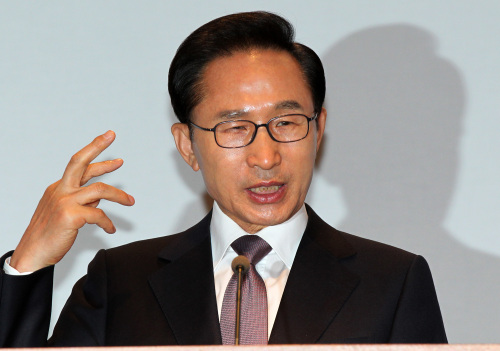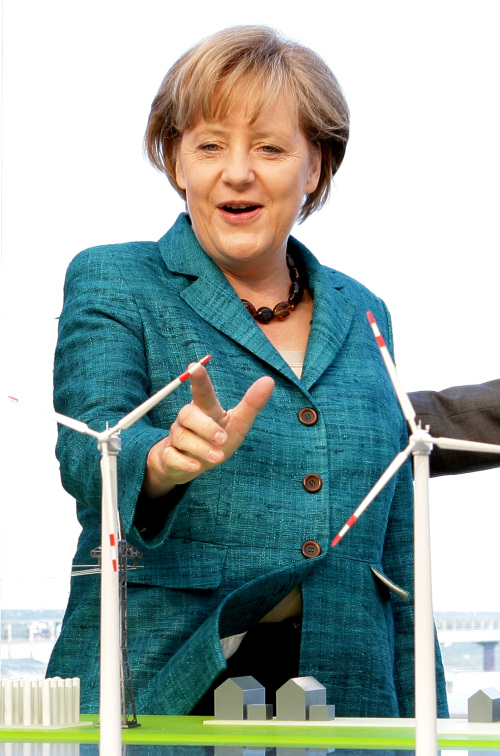Lee discusses economic ties, reunification with German leaders
By 김소현Published : May 9, 2011 - 19:12
President says existence of nuclear arms on Korean Peninsula will delay reunification
BERLIN -- President Lee Myung-bak and German Chancellor Angela Merkel on Monday discussed ways to strengthen economic ties, especially for the development of renewable energy, during their talks here in the German capital.
Lee’s talks with Merkel came after the Korean president held a summit meeting earlier in the day with German President Christian Wulff, during which the two agreed to push for greater bilateral collaboration in developing industrial materials and components, electric cars and renewable energy.
Lee also agreed with Wulff and Merkel to keep up with ongoing efforts to share Germany’s experience in reunifying the East and West to help South Korea better prepare for reuniting with the North.
Lee, on the first leg of his weeklong European tour, met with Chancellor Merkel for the third time. They previously held talks on the sidelines of last year’s ASEM Summit in Brussels in October and the Seoul G20 Summit in November.
Noting that Korea’s free trade agreement with the European Union, which will tentatively take effect on July 1, would provide a momentum in promoting bilateral trade and investment between their countries, Lee and Merkel agreed to strengthen ties in future-oriented areas such as renewable energy development and low-carbon, green growth, Cheong Wa Dae said.
The ruling Grand National Party, which controls more than half the parliamentary seats, gave the green light to the Korea-EU FTA last week despite the main opposition Democratic Party’s boycott. The DP refused to attend the National Assembly session, citing the need for further discussions on measures to minimize the damage mostly to Korea’s hog-raisers.
Having received an environmental award for his “green growth” policy initiative from his key business partner the United Arab Emirates late last year, Lee is pushing to expand ties with European leaders of eco-friendly industries.
BERLIN -- President Lee Myung-bak and German Chancellor Angela Merkel on Monday discussed ways to strengthen economic ties, especially for the development of renewable energy, during their talks here in the German capital.
Lee’s talks with Merkel came after the Korean president held a summit meeting earlier in the day with German President Christian Wulff, during which the two agreed to push for greater bilateral collaboration in developing industrial materials and components, electric cars and renewable energy.
Lee also agreed with Wulff and Merkel to keep up with ongoing efforts to share Germany’s experience in reunifying the East and West to help South Korea better prepare for reuniting with the North.
Lee, on the first leg of his weeklong European tour, met with Chancellor Merkel for the third time. They previously held talks on the sidelines of last year’s ASEM Summit in Brussels in October and the Seoul G20 Summit in November.
Noting that Korea’s free trade agreement with the European Union, which will tentatively take effect on July 1, would provide a momentum in promoting bilateral trade and investment between their countries, Lee and Merkel agreed to strengthen ties in future-oriented areas such as renewable energy development and low-carbon, green growth, Cheong Wa Dae said.
The ruling Grand National Party, which controls more than half the parliamentary seats, gave the green light to the Korea-EU FTA last week despite the main opposition Democratic Party’s boycott. The DP refused to attend the National Assembly session, citing the need for further discussions on measures to minimize the damage mostly to Korea’s hog-raisers.
Having received an environmental award for his “green growth” policy initiative from his key business partner the United Arab Emirates late last year, Lee is pushing to expand ties with European leaders of eco-friendly industries.


Merkel, who holds a PhD in physics and served as minister for the environment, nature conservation and nuclear safety, is perceived as pro-nuclear energy. Problems related to future energy development have been one of the major issues of her tenure since 2005.
In addition to the economic cooperation, Lee and Merkel assessed their countries’ cooperation on issues related to reunification under a preliminary agreement signed between Seoul’s Unification Ministry and Berlin’s federal ministry of the interior.
Under the memorandum of understanding, Seoul will receive a massive database from Berlin on the 1990 reunification of East and West Germany.
In addition to sharing the German documents and materials on exchanges between the East and West, negotiations for reunification, reconstruction of East Germany, social integration, mutual growth after reunification and estimation of unification costs, South Korea and Germany will hold an annual conference on reunification.
Former policymakers and other experts who participated in the reunification process will discuss issues of mutual concern in Seoul around September. Seoul and Berlin will take turns to host the annual consultative conference.
“The two leaders also exchanged views on recent developments around the Korean Peninsula, the G20 agenda, climate control and aid for developing countries,” Cheong Wa Dae said.
“President Lee also appreciated Germany’s contribution for peace and stability on the Korean Peninsula, while Chancellor Merkel reaffirmed Germany’s support for Seoul’s policies for peace and stability on the peninsula and commitment to play a constructive role.”
Lee had spoken with Merkel on the telephone at Berlin’s request a day after the North shelled a South Korean island near the inter-Korean border last November, killing four South Koreans including two civilians.
Also on Monday, Lee attended a luncheon hosted by Berlin Mayor Klaus Wowereit at Rotes Rathaus, or the Red City Hall, after stopping by at the Brandenburger Tor, the symbol of unified Germany.
Lee and Wowereit exchanged a wide range of views on bilateral relations and Berlin’s experience of integrating East and West Germany, Cheong Wa Dae said.
Having taken office as the mayor in 2001, Wowereit, a member of the Social Democratic Party, is known for enhancing the city government’s financial soundness through budget cuts and restructuring. He is often mentioned a possible SPD candidate for the Chancellorship of Germany in the next German federal election.
Lee arrived in Berlin Sunday afternoon and is slated to visit Frankfurt, Copenhagen and Paris later this week.
Lee reiterated that the existence of nuclear weapons on the Korean Peninsula would delay reunification of the South and North, adding that his government was preparing for dialogue with Pyongyang
“That there are nuclear weapons on the Korean Peninsula will delay reunification,” Lee said during a meeting with some 300 South Korean residents in Berlin Sunday evening.
“The North must give up its nuclear ambitions and save its economy like China and Vietnam for the 20 million North Korean people. (Seoul) is ready to hold dialogue with the North whenever it reaches out with a sincere heart.”
Having suggested last year the introduction of “unification tax” to finance the integration with one of the world’s poorest countries, Lee was expected to seek Berlin’s advice on the matter.
“There are fears over the costs of reunification, but most Koreans agree that (the South and North) must reunite,” Lee said.
“I plan to discuss unification issues as well as economic cooperation during my visit here.”
By Kim So-hyun (sophie@heraldcorp.com)








![[Kim Seong-kon] Democracy and the future of South Korea](http://res.heraldm.com/phpwas/restmb_idxmake.php?idx=644&simg=/content/image/2024/04/16/20240416050802_0.jpg&u=)







![[KH Explains] Hyundai's full hybrid edge to pay off amid slow transition to pure EVs](http://res.heraldm.com/phpwas/restmb_idxmake.php?idx=652&simg=/content/image/2024/04/18/20240418050645_0.jpg&u=20240418181020)

![[Today’s K-pop] Zico drops snippet of collaboration with Jennie](http://res.heraldm.com/phpwas/restmb_idxmake.php?idx=642&simg=/content/image/2024/04/18/20240418050702_0.jpg&u=)